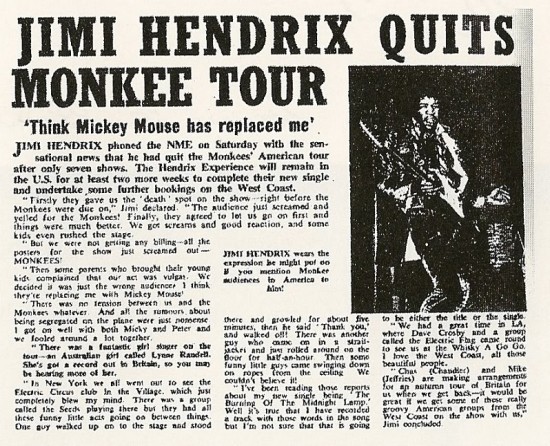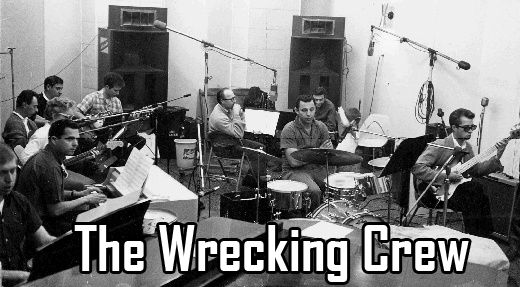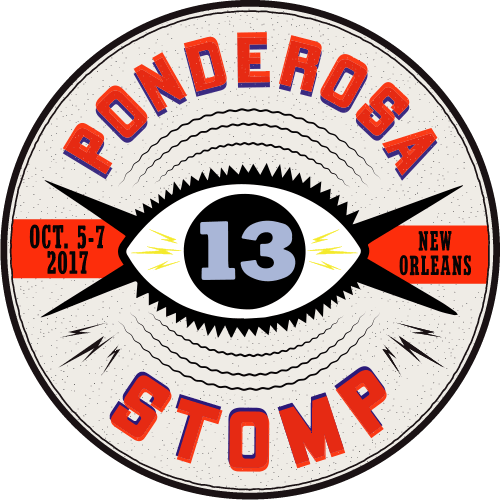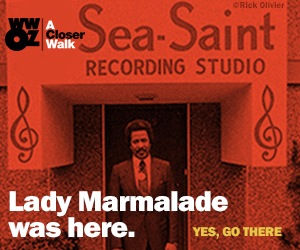Forget Felix Unger and Oscar Madison. It’s well-known today as one of the most “WTF!!!” odd couples in rock ‘n’ roll history: In the summer of 1967, guitar god Jimi Hendrix – still mostly unknown in the U.S. – signed on as the opening act for The Monkees.
That Hendrix would accept promoter Dick Clark’s offer is even more incongruous given comments he made a few months earlier about The Monkees to “Melody Maker” magazine: “Oh God, I hate them! Dishwater. I really hate somebody like that to make it so big.”
Whether Hendrix hated their image or their music more is unclear – he actually got along well with The Monkees themselves, who were fans of his sound – and he wound up quitting the tour after just eight dates largely because of the screaming indifference (and sometimes boiling hostility) of the teenybopper hordes.
Perhaps Hendrix would have stayed longer if the actual musicians who laid the tracks on The Monkees’ early tunes had been on the tour – remember, The Monkees started as a TV show about a rock band, not an actual performing band. The anonymous pros in those early days really could play, and they included several members of the Los Angeles studio clique known as “The Wrecking Crew,” such as Glen Campbell, James Burton, Louis Shelton, and Hal Blaine.
However, the core band creating the soundtrack for the Monkees’ TV show and first records were known as The Candy Store Prophets, fronted by singer-songwriters Tommy Boyce and Bobby Hart, who together composed “Last Train to Clarksville,” “(I’m Not Your” Steppin’ Stone,” and other Monkees hits (not to mention Fats Domino’s million-selling “Be My Guest”).
The Candy Store Prophets’ rhythm section comprised drummer Billy Lewis; bassist Larry Taylor, a future Canned Heat member and longtime Tom Waits sideman; and guitarist Gerry McGee, a seasoned session musician and son of legendary Louisiana fiddler Dennis McGee, who has been called “the Rosetta Stone of Cajun music.” [Note: McGee’s first name is correctly spelled “Gerry,” though his name often appears as “Jerry” in discographies.]
It was Gerry McGee who would go on to join another of the oddest matchups in rock history: In 1967, the Eunice, La., native who created the riffs for the Monkees’ theme song and “Clarksville” was recruited to join Captain Beefheart’s Magic Band when Ry Cooder quit in disgust after recording the landmark “Safe As Milk” LP.
“Ry left after the Mt. Tamalpais mess where Don [Van Vliet, aka Captain Beefheart] freaked out on stage,” recalled bassist Jerry Henley. “After Ry left, we got a fellow named Gerry McGee. He was a studio guy who had played on most of the Monkees’ records. As you can imagine, his style was quite different from ours. … He was known for his finger picking and played the lead on the Monkees’ ‘Last Train to Clarksville.’ I really enjoyed his playing. Between him and Ry Cooder, we let some great players slip through our hands. But as you probably know Don was not the most congenial person to work with. I don’t think Gerry knew what he was getting into.”

Drummer John “Drumbo” French also recalled McGee’s entry into the Magic Band in his memoir “Beefheart: Through the Eyes of Magic”: Beefheart’s producer, Bob Krasnow, “informed us that a guitarist by the name of Gerry McGee was the man most likely and most qualified” to replace Ry Cooder, French wrote. “He was a great player. He seemed to be able to play any style, and I enjoyed the fact that he could finger pick.”
“A STRONG PART” OF BEEFHEART’S FUTURE MUSIC
“We rehearsed with Gerry at the house on Amao Road in Laurel Canyon,” French wrote. “There is a song that was written around that time called ‘Flower Pot.’ … Gerry’s guitar style was put to good use in this song as he played the first riff of the song in his warmup to check the amp. This is when I first realized that Don utilized everything somebody played to him, and changed his writing to fit the player. … There were parts that Vliet then played on harmonica that Gerry copied on the guitar, all the while hammering a bass rhythm with his thumb. This fingerpicking style, which Ry also used, was suddenly found to be of interest. It would become a strong part of the style of Don’s future music.”
“I probably started a guitar riff, like a country thing,” McGee said of his role in contributing to the song, the sound of which would influence Beefheart’s subsequent work, including his masterpiece “Trout Mask Replica” (#60 on Rolling Stone magazine’s list of “The Top 500 Greatest Albums of All Time”):
https://www.youtube.com/watch?v=hlPU_qicbbk
Having a family to support and having already done his fair share of well-paying session work, McGee requested a weekly salary. “I had kids,” McGee confirmed. “I needed money. And the band wasn’t working much. … But he paid me when I was in the band. I insisted. Maybe he felt bad because I had kids.”
“I DON’T WANNA PLAY NO FRANK ZAPPA MUSIC”
McGee also put his foot down when it came to playing some of Beefheart’s more experimental music. “I don’t wanna play no Frank Zappa music,” French recalled McGee saying.
“We all knew how this must have made Don feel,” French wrote. “After all, he didn’t consider his music anything like Frank’s. Most people know that Frank’s music is completely different. On top of that, Don was always speaking of how superior his music was to Zappa’s, so to have someone listen to his music and call it ‘Frank Zappa music’ was not going to set well. … Interestingly enough, the musical suggestion that had caused Gerry to make his ‘Frank Zappa music’ statement was that Don asked him to play ‘The Star-Spangled Banner’ on guitar. This was a full two years before Jimi did this very same thing at Woodstock.”

The band played at least two official dates with Gerry McGee on guitar, as well as some rehearsals in a public park. “We had a gig with Gerry at a club called The Peppermint Twist. It was left over from the earlier ‘60s days, when ‘The Twist’ was popular. … We also played the Santa Monica Civic Auditorium on the same bill with The Yardbirds. We were the opening act. … Gerry McGee walked onstage with his tiny little amp at the last minute – like he did this everyday. He was always cool and collected. We weren’t loud on stage at all. But the sound man made us sound just as big as The Yardbirds. Gerry and Don did a great interplay during a version of ‘I’m Mad,’ an old John Lee Hooker tune. The best audience reaction was to the blues. I think this was one of the best performances of the Magic Band in the context of public accessibility.”
Van Vliet was so difficult to work with at times that the band actually discussed mutiny – and this was even before the hellacious Guantanamo Bay-style conditions that would infamously mar (and fuel) the “Trout Mask Replica” sessions. “Alex (‘St. Claire’ Snouffer) and Fran both began to work on me about getting rid of Don and just being a four-piece group with Gerry McGee,” French wrote. “A lot of animosity and resentment had been stirred up by Don’s failure to perform at Mt. Tamalpais.” But it wasn’t to be. McGee quit to return to work as a hired gun elsewhere.
“A PROFOUND INFLUENCE” ON THE MAGIC BAND
Despite McGee’s brief tour of duty, he made a lasting impression. “Gerry was in the band but a short time, yet he had a profound influence on the musical direction the band would take in the future,” French wrote. “Don had a great deal of respect for him, as did we all. He was prone to country playing more than anything else. Yet his adaptation of Don’s ideas, along with Don’s utilization of his playing styles, compounded to release whole areas of creativity that had never been tapped. Don has told me often that Gerry said to him, ‘If you ever get something going, let me know.’ There was a mutual respect there, but Gerry was wise enough to realize that the band was a financial disaster.”
And today, McGee speaks highly of Beefheart. “He was certainly unique, Beefheart. He was such a great blues singer. I tried to persuade him go the blues route, but …
“Too bad way back everyone was broke and living on food stamps. Now that he’s passed, he’s wealthy (from his highly priced artwork). I saw things he was painting. Talented guy. Eccentric … crazy … complex. … Those guys were always stoned. … It’s bizarre. I can’t believe I was actually in that band,” McGee marveled in 2015.
THIS GUN’S FOR HIRE — AGAIN
Jeff Cotton joined The Magic Band in place of McGee, who himself would find a steady job in 1968, replacing Nokie Edwards in The Ventures. McGee also would go on to amass a stunning array of credits in subsequent years, backing the likes of Delaney and Bonnie, Kris Kristofferson, Dwight Yoakum, T-Bone Burnett, Emmylou Harris, The Everly Brothers, Roy Orbison, Rita Coolidge, ex-Byrds member Gene Clark, and more. McGee was inducted into the Rock and Roll Hall of Fame with The Ventures and also the Louisiana Music Hall of Fame and the Rockabilly Hall of Fame.
Check out an example of McGee’s country picking style on “Gumbo,” his original composition that appears on The Ventures’ 1969 album called “Swamp Rock”:
And here’s McGee jamming informally with a thumbpick at LsL Instruments in California on a tune titled “Gerry McGee Special”:
“THE MOST INSPIRING SINGLE LICK”
McGee’s influence has stretched well beyond the early work of Captain Beefheart. His well-traveled life as a musician, actor, and cultural standard bearer has been documented by acclaimed Cajun filmmaker Pat Mire in his biopic “Sushi and Sauce Picante.”
And here’s a tribute from virtuoso Jerry Donahue (of Fairport Convention, Fotheringay, and The Hellecasters), who as a teen received some key lessons from McGee. “Gerry McGee was the first guy I saw reach behind the nut to bend a string and that moment changed my life forever,” he said in a recent interview. “I was just 13 or 14 at the time, and he showed me how to do it. He executed it on a banjo tune he was performing in a Hollywood nightclub called The Sea Witch in order to emulate a Scruggs peg. When he’d said that was the one he thought of for a specific purpose only, it was apparently no ‘biggie’ to him. To me however, it was probably the most inspiring single lick I’d ever heard/seen and that’s what set me off.”
Watch Donahue describe more of McGee’s style in the video below (starting at minute 1:00). McGee “never really got the recognition I thought that he deserved,” Donahue says. “He’s just a stunning player.” And be sure to catch Gerry McGee, one of rock ‘n’ roll’s truly unsung heroes, at the 2015 Ponderosa Stomp:








